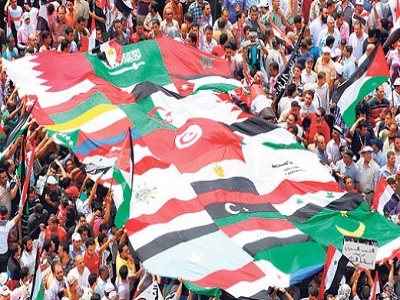
By Samah Sabawi
The year 2014 begins while the Arab World continues to plummet into further conflicts, instability and terror. Desperate for reprieve and filled with a sense of nostalgia, my mind escapes to 40 years ago, to the year 1974, just before the outbreak of the Lebanese civil war, when my father took us on a road trip across the Arab world.
Back then we lived in Dammam in Saudi Arabia and the trip was our first family vacation since we were exiled out of Palestine. I was only six years old, refusing to be crammed in the back of our sedan along with my five siblings, I felt lucky to be petite enough to stretch my small body across the rear deck. My face stuck to the rear window and my eyes wide open. I can remember till this day every small detail of the two months journey: the sights the smells and the sounds of the Arab World.
I can still see the sand dunes and camel caravans of Saudi Arabia, feel the warm salty waters of the gulf in Kuwait, hear the humming of factories that stretched for miles along the Euphrates river, envision the manicured trees lining up the impeccable streets of Baghdad city, the beautiful rolling hills of Jordan, the astonishing beauty that is Lebanon and the simplicity of life in Syria. On this road trip I learned my geography, embraced my Arab identity and developed a strong sense of Arab nationalism.
It was on this trip that I learned that the lines between the Muslim sects were blurry and insignificant when we, a Sunni family casually stopped to pray at a shia mosque on the outskirts of Baghdad. On this trip I learned that Arabs were generous and hospitable. One of my favorite memories was of how after driving through the Arabian desert for a full day we felt tired so we pulled into a small tiny town in the north of Saudi Arabia. My father simply rolled down the window and called for a boy standing by the side of the road and asked him to point us to where the Palestinian teacher’s house was. My father knew that in every town in Saudi Arabia there would be at least one Palestinian refugee working as a teacher. Sure enough the boy took us to a small modest house shared by two Palestinian brothers, both teachers at the primary school. My father stood at their door and said “We are a Palestinian family travelling and we need a place to stay”. The two brothers took us in, their wives cooked us dinner and they gave us their beds to sleep on. The next morning they gave us breakfast and sent us on our way with extra sandwiches and water bottles.
In Lebanon when we couldn’t find a restaurant after driving for hours on the mountain ranges we stopped at someone’s house to ask if they knew where we could go to eat. They insisted that we were their guests and simply wouldn’t take no for an answer. They gave us a feast before sending us on our way with full stomachs and treasured memories.
The biggest highlight of the trip for me personally was that it included my first theatre experience. My father took us to see the Duraid Lahham play Dhay’at Tishreen at the magnificent Hamra theatre in Beirut, an experience I can still brag about till this day!
There are many more stories in my trove of wonderful memories of an Arab world that was embracing modernity while safeguarding its heritage: A world of music, museums, mosques, theatres, universities, factories and gardens. In my mind, the Arab world is still stuck in 1974, just before the Lebanese civil war began, before the escalations, the polarizations, the conflicts and the endless divisions.
Today it is no longer safe to do a road trip in the Arab World. Many of these countries are no longer safe to visit. That sense of generosity and old-fashioned hospitality experienced back then has probably now fallen victim to the growing mistrust and the violence that continues to spread and to spare no one.
Back in 1974, I slept in my father’s arms in the desert south of Baghdad one night looking at the stars above as he recited poetry I could not at the time understand. They were his poems of yearnings for Palestine. My father was under no illusion even back then. He knew that divisions existed and that borders prevented him from reaching his homeland. He knew that beneath the seeming calmness of the desert night, ill wind would blow across the region and that the enemy was at the gates. But all I knew at six was that I belonged to a vast world of multiple dialects sounds and flavors and that I loved every bit of it.
– Samah Sabawi is a Palestinian-Canadian-Australian author, poet, commentator and playwright. She contributed this article to PalestineChronicle.com. Visit: www.talesofacitybythesea.com.




